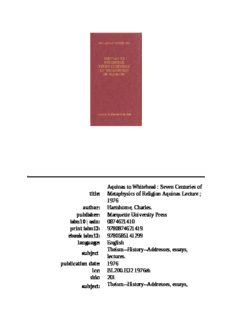Table Of ContentAquinas to Whitehead : Seven Centuries of
title: Metaphysics of Religion Aquinas Lecture ;
1976
author: Hartshorne, Charles.
publisher: Marquette University Press
isbn10 | asin: 0874621410
print isbn13: 9780874621419
ebook isbn13: 9780585141299
language: English
Theism--History--Addresses, essays,
subject
lectures.
publication date: 1976
lcc: BL200.H32 1976eb
ddc: 201
Theism--History--Addresses, essays,
subject:
lectures.
Page i
The Aquinas Lecture, 1976
Aquinas to Whitehead: Seven Centuries of
Metaphysics of Religion
Under the auspices of the Wisconsin-Alpha Chapter of
Phi Sigma Tau
By Charles E. Hartshorne, Ph.D.
MARQUETTE UNIVERSITY PUBLICATIONS
MILWAUKEE
1976
Page ii
Library of Congress Catalog Card Number 76-5156
© Copyright 1976
Marquette University
ISBN 0-87462-141-0
PRINTED IN U.S.A.
Page iii
Prefatory
The Wisconsin Alpha Chapter of Phi Sigma Tau, the National Honor
Society for Philosophy at Marquette University, each year invites a
scholar to deliver a lecture in honor of St. Thomas Aquinas. This year
the lecture was delivered on Sunday, February 22, 1976.
The 1976 Aquinas Lecture Aquinas to Whitehead: Seven Centuries of
Metaphysics of Religion was delivered in Todd Wehr Chemistry by
Professor Charles E. Hartshorne, Professor of Philosophy, the
University of Texas at Austin.
Professor Hartshorne was born on June 5, 1897, in Kittanning,
Pennsylvania. He earned the A.B. at Haverford College in 1917, his
M.A. at Harvard in 1921 and his Ph.D. in 1923. He studied two years
at the University of Freiburg and one year at the University of
Marburg in Germany. He began teaching at Harvard University and
after three years joined the faculty of the University of Chicago where
he taught for the next 27 years, until 1955. He taught at Emory
University from 1956 to 1962
Page iv
and the following year joined the faculty at the University of Texas at
Austin, where he became the Ashbel Smith Professor of Philosophy in
1963. Professor Hartshorne has been visiting professor in Germany,
India, Australia, and Japan and has given the Terry Lectures (Yale,
1947) and the Dudleian Lectures (Harvard, 1966). He has served as
president of the Charles Peirce Society (1950-51), of the American
Metaphysical Society (1954-55), and of the Southern Society of
Philosophy and Religion (1963-64).
Professor Hartshorne's study has followed two major interests, human
knowledge and God. He has sought to advance the process philosophy
of Alfred Whitehead. Among his numerous publications are: The
Philosophy and Psychology of Sensation (1934); Beyond Humanism
(1937); Man's Vision of God (1941); The Divine Relativity (1948);
Reality as Social Process (1953); Philosophers Speak of God (1953);
The Logic of Perfection (1962); Anselm's Discovery (1965); A Natural
Theology of Our Time (1967); Creative Synthesis and Philosophical
Page v
Method (1970); Whitehead's Philosophy: Selected Essays, 1935-70
(1972); and articles in many journals.
To these distinguished publications Phi Sigma Tau is pleased to add:
Aquinas to Whitehead: Seven Centuries of Metaphysics of Religion.
Page 1
Aquinas to Whitehead: Seven Centuries of Metaphysics
of Religion
When I began preparing this lecture I though I should try to find some
way to mitigate the extent of my disagreements with the Thomistic
position, seek some almost neutral subject, or perhaps make a
comparison of Thomism with my version of process philosophy
largely without argument as to which is nearer the truth. However, for
better or worse, I hope for better, I have departed from this plan. For
one thing it has seemed reasonable to assume that those who selected
me for this honor must know my views. To understate these views, to
blur issues, would perhaps be an inappropriate way to respond to what
seems an act of courage on the part of those who invited me.
The subject of this lecture is too vast
Page 2
for more than extremely sketchy and selective treatment. However,
much of what I shall omit is well known. It is chiefly some rather
neglected aspects of intellectual history that I shall be giving you.
I have been called "an anti-Thomistic Thomist." There is this much
truth in the description: the Angelic Doctor expressed sharply defined
views on some of the chief topics with which I have been concerned.
With some, but by no means all, of these views I feel compelled to
differ quite definitely. Both the agreements and the disagreements
seem more definite than would be suggested by terming me an anti-
Hegelian Hegelianas Marx might be said to be. I do agree with Hegel
that the [philosophic] truth is in some sense the "union of contraries"
and that, in the subject-object correlation, subject "overlaps.'' But
beyond these vague similarities I find little use for Hegel, whether by
way of agreement or disagreement. He seems to be pervasively
ambiguous or unclear, and I aim at clarity. So, I think, did the Angelic
Doctor.
Page 3
As Pegis has pointed out, Aquinas wrote chiefly theology rather than
philosophy. Here we are concerned with the philosophy that seems
more or less clearly implied by, or used in, the theology. Like many
other great philosophers and theologians, Aquinas has been very
variously estimated. Even among members of the church to whose
cause he was dedicated, this has been true.
Long ago in Paris I called upon a pious monk, Père Laberthonnière,
who characterized the most influential of thirteenth century thinkers
as "the greatest sophist that ever lived." When I asked him to illustrate
his meaning, he opened a volume of one of the Summas to the place
where the problem of evil is dealt with and it is pointed out that God,
having the beauty or plenitude of the cosmos in view, endows each
creature with its appropriate defects. My French friend's comment
was, "Il s'amuse!" I thought I understood what he meant. He also
declared that he "abhorred the Middle Ages." Like some Protestant
scholars, he thought that the influ-

